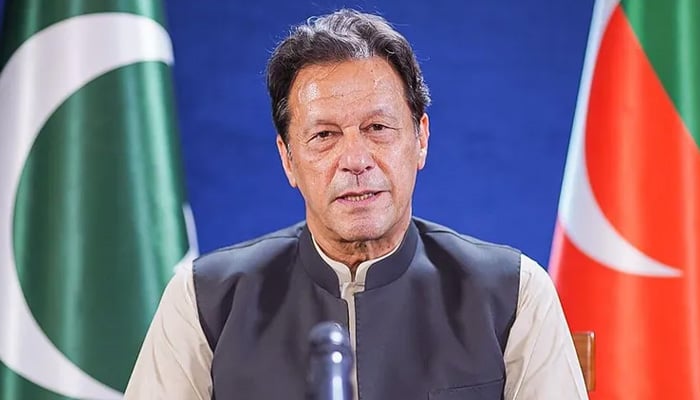 |
In a new petition, Imran Khan told the IHC that he will appear in the district court tomorrow
Islamabad: The Islamabad High Court (IHC) on Friday restrained Pakistan Tehreek-e-Insaf (PTI) chief Imran Khan from arrest in the Toshakhan case.
The IHC heard the plea of Chief Adalat Judge Farooq Khan challenging the Islamabad District and Majlis Court order to arrest the PTI chief.
The Supreme Court said the former prime minister should be given an opportunity to appear in court.
The IHC registrar had opposed Hosha's plea to challenge his arrest in the Toshakhan case.
According to authorities, biometric verification of PTI chief is not available. His office also asked.
The court then accepted Khan's appeal over the RO's objection.
At the beginning of today's hearing, the Chief Justice of the IHC asked about the objections raised in the petition. Khan's lawyer, Khawaja Haris, said the biometric verification issue had been resolved.
As for those who challenged the IHC's decision on the previous proposal, he said the court has referred the matter to the trial court.
"We have asked the court to investigate the matter," the chief justice said.
Khan's counsel then asked the bench to allow the arrest warrant for the PTI chief's appearance in court.
Justice Farooq warned the lawyer that if he did not fulfill his promise, there would be consequences and contempt proceedings would be initiated.
The court later granted relief to Imran Khan and ordered the police not to arrest him.
The IHC has also directed the district administration and Islamabad police to provide security.
In this petition, the former prime minister rejected the Islamabad court's appeal to stay the verdict passed against him in the Toshakhan case.
Khan, who lives at his Zaman Park residence in Lahore, filed the petition through Haris's lawyer despite a court order to appear.
The PTI chief said in his petition that "bonds should be granted and police arrests should be stopped".
The PTI chief also assured the court that he will appear in the Islamabad court tomorrow (Saturday) and requested the court to hear his plea as soon as possible.
It says "...respected".
It is common law that the granting of non-bailable affidavits serves the purpose of securing the existence of the accused and the proceedings. The arrest and detention of the plaintiff will serve no purpose and will only serve to humiliate anything,” he said.
Description
An Islamabad court on February 28 announced that it would indict the former prime minister in the case, but his lawyer requested that he be excused from appearing in person as he had to appear
The court has stayed the charges in the case several times.
When Imran Khan walked out of the hearing, the court failed to secure his arrest and the police ordered him to be produced on March 7.
Khan, however, went to the IHC, reserved affidavits and ordered him to appear in the court of Additional District and Sessions Judge Iqbal on March 13, but the PTI chief walked out of the trial.
Police arrested Imran Khan on March 18 and produced him in court.
A police team was sent to Lahore to arrest Khan, but efforts to arrest him led to violent clashes between police and PTI workers, killing more than 60 law enforcers.
On Tuesday, Imran Khan filed a petition in the IHC against the re-issuance of the warrant, but his plea was rejected and referred to the court.
On Thursday, PTI filed a petition in the court of Justice Zafar Iqbal, but the petition was dismissed.



0 Comments